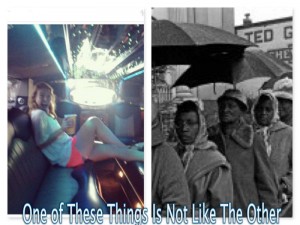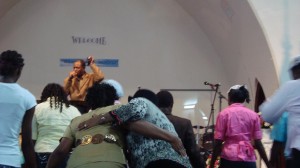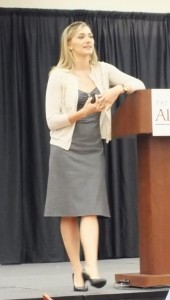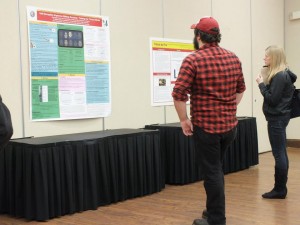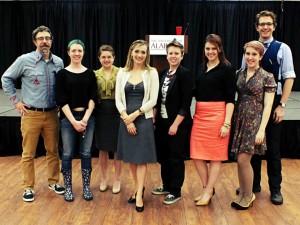What better way to kick off my first blog entry than providing a wrap-up of how Darwinism leaped off the page and into the very mitochondria of my 140-some-odd-trillion cells over the past year, and how this culminated in my attendance of the 3rd Annual Ancestral Health Symposium?
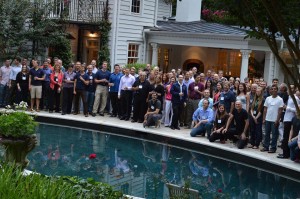
Presenters’ Dinner at Boyd Eaton’s House in Atlanta, GA, 15 August 2013
I have a great job in many ways. I work on the campus of the University of Alabama, my beloved alma mater, and so can converse with my friends on the faculty, attend lectures and events, and contribute to the Evolutionary Working Group, of which I am a member. As a field biologist I get to see nature up close all across my largely still wild state. While I lack some of the research opportunities of a university professor, I am freed from the “publish or perish” pressures that faculty have to face, and am thus free of the suffocating narrowing of knowledge this can produce. Don’t get me wrong, I’m glad that some people have the temperament, skills, and resources to push deep into the unknown, but this comes at a price: as E. O. Wilson, my friend and fellow UA alum, argues in Consilience, knowledge is fragmented and the problems we face demand the ability to unify knowledge across the “academic archipelago” as David Sloan Wilson calls it. Everyone pays lip service to the need for Consilience, but the university structure does little to advance it in practice. EvoS is a shining counter-example however, and it is a great honor to be among its blog contributors. The goals of the Ancestral Health Society will, I believe, be among the best fruits which Consilience can yield.
I read Health and the Rise of Civilization by Mark Nathan Cohen way back around 2004 and Loren Cordain’s book The Paleo Diet in 2005 and recognized that the evolutionary logic was sound and clicked with evolutionary mismatch theory I saw being employed in the evolutionary psychology literature. It all made sense but I thought that I was immune to the effects of Neolithic foods, and besides, I was a RUNNER! A tough guy. Obesity and metabolic syndrome only happen to people who lack the willpower to push through the pain of exercise, right?
While I plan to write more about this in future blogs, in short—in spite of 20 years of being a consistent runner, sometimes rugby and American-style football player, and pretty health-conscious, educated man, in my mid-30s I started feeling old: low energy, lethargy, disrupted sleep, gout(!), joint pain, worsening generalized anxiety, and weight gain. I was becoming metabolically broken, but the onset was so gradual, and the symptoms so hard to clearly discern, that I just continued to think “running always kept me healthy before, maybe I just need to run more.” Plus, I was still healthy enough to run 5 miles. If I could do this, surely I’m not getting really sick. I never guessed I could have trouble brewing in the Krebs Cycle every time my mitochondria produced an ATP (which happens all the time…like millions of times per second).
That was before I read Gary Taubes and finally realized the role of proper fat intake, insulin signaling, and insulin receptor downregulation. So, after a sad breakup, I was highly motivated to shake things up a bit. Just as an experiment to see if I had damaged proper insulin signaling, starting March 15 of 2012 and for three weeks I ate no plant material at all. Coincidentally, I had patellar tendonitis at the same time, and ran perhaps 2 miles one time during this initial three week period—my only exercise other than routine field work. It was all bacon and eggs, pork chops and broccoli, sardines and avocados.
Within 2-3 days I had greatly improved energy. By 2.5 weeks I re-measured my waist circumference: 3 inches of belly fat were gone and I could see my abs for the first time in 3 years. I noticed that when I got out of bed in the morning or started a run, my ankles no longer hurt. Best of all though, 39 years of generalized anxiety which had become part of my background reality washed away. For this reason alone I would probably continue to eat paleo even if all of that saturated fat consumption had caused my cholesterol readings to be horrible. But it didn’t hurt my lipid profile…actually “didn’t hurt” is the wrong term…“gave me the lipid profile of a healthy 17 year old hunter-gatherer the day he kills his first antelope” is more like it. More on this in future blog posts, but suffice it to say that for the past 40 years, the entire field of nutrition science didn’t just get it wrong, but exactly and precisely wrong. I think some heads need to roll.
When you are a 39 year old single man, feel better than you ever have, and fantasize about having a third career on the football field, you want to get more of that knowledge that restored your vitality. So, for the next year I read the “paleosphere” voraciously, re-read important works in evolutionary medicine, watched again the videos from the first Ancestral Health Symposium (AHS), and eagerly watched new ones as they were released from AHS 2012.
I started teaching introductory biology in the evenings and making extra money and when I got my first paycheck, I immediately registered for AHS 2013, which thankfully took place in Atlanta, Georgia—an easy drive from Tuscaloosa.
I arrived late to share a room with Ben Greenfield, who is preparing to run an Ironman Triathlon on a quarter of the carbohydrates most participants use as fuel, and I managed to get to sleep the night before the conference started in spite of my excitement. I woke up the next morning and skipped breakfast (because you can do that without problem when you are a fat-burning caveman), showered, took the elevator down, and when the door opened I almost hyperventilated when I saw all of these “paleocelebrities.”
I’m still a little sleep deprived at time writing this thanks to the stellar conversations I had with Dan Pardi (a leading sleep researcher who is crushing it on many fronts) and others at 3am in the hotel, but AHS 2013 is over, I attended, and below are some of my initial thoughts:
I brought a camera thinking I would get my photo taken standing my some of my new-found heroes, but I barely used it—I was too busy sharing ideas, conversing, telling stories to, hanging out and drinking wine (hormetic stressor, right?) with these marvelous humans.
Aaron Blaisdell—Co-founder of the Society—and I discovered immediately that we are each descendants of the Tinbergen Legacy, and share the view that we animals are machines that robotically respond to certain cues, can be tricked as easily as Niko’s gulls, and that awareness of this makes us rather unique robot vehicles.
Keith and Michelle Norris—sponsors of PaleoFx, the “theory to practice” flip side to the ancestral approach—and I had a blast talking about all kinds of topics. Michelle gives the best hugs, and Keith and I will be taking bets on the Texas A&M vs. Bama game this season.
I managed not to cry when I thanked Robb Wolf for helping me avoid going down the road I watched my father and grandfather go down with all manner of metabolic syndrome co-morbidities, as the sadness hit me that this knowledge wasn’t available to help our immediate ancestors and that no amount of future science can undo the pain suffered by those who went before us and gave us life (a sentiment shared by all of us as we learned that Robb’s own mother passed away a week before the Symposium).
I talked with Tucker Max about my speech impediment, how young males aren’t designed to stay cooped up in libraries with their noses crammed into science books, how doing this in my youth caused my speech to quickly worsen, and how mismatch theory, and getting the snot knocked out of me and getting back up on the rugby field helped me get a real handle on my fluency. And do OK with the ladies.
I was amazed to hear everyone’s stories of how going paleo helped them lose weight, or cure Irritable Bowel Syndrome, or Crohns disease, or lupus, or arthritis, or any number of ailments which had been unresponsive to previous medical treatments. That’s what the critics don’t get—because diet is such a fundamental aspect of what an organism does, and has profound effects on gene expression, if a species eats a diet it didn’t evolve to eat, it shouldn’t be surprising if this can lead to any number of disease manifestations, and so fixing it can heal a wide range of ailments.
I was heartened by the stories of people who were still suffering from a condition for which they were there in search of new approaches. The rigor, sophistication, and excitement of everyone at AHS gives me hope that novel cures and treatment protocols will be found.
I had the great pleasure of having dinner at the house of our gracious host, Boyd Eaton, and wonder why his book The Paleo Prescription couldn’t have taken off back in 1985.
I spent 30 minutes discussing my blood chemistry data with Mel Konner, Ph.D., M.D., the pioneering medical anthropologist who, along with his wife Marjorie Shostak, lived alongside the !Kung Bushmen. I asked him something I’ve always wondered: how hunter-gatherers trim their finger- and toenails?
Grayson Wheatley, M.D. and heart specialist assured me that I wasn’t going to die due to having LDL cholesterol levels that were too low from eating a high fat diet, and instead of eating 6-11 servings of grain per day as recommended by the USDA, eating more like 0. Good to know; I was a little worried that my LDL reading of 0.00 mg/dL (or below the level of instrument detectability) was going to kill me. He was shaking his head and grinning as he walked off. I suspect he was thinking “man, my cardiology colleagues screwed up this badly.”
I talked with Geoffrey Miller about the evolution of animal genitalia, how variation of human glans shape might correlate with other traits, and how I wouldn’t want to be the graduate student charged with the task of taking morphometric measurements of human male penis shape.
I met Nando Palusi whose Psychology Today blog “Neanderthink” I read, and upcoming ALLELE Speaker Gad Saad.
I met Esther Gokhale—expert on posture and back pain—purchased her book, and had her inscribe it to my mother who has long suffered with the exquisite pain of chronic back problems.
I could go on, but besides the new friends and acquaintances I made, one thing which those of us in the Ancestral Health community realize, but science journalists still need an advanced tutorial in: life depends on stability in the hereditary mechanisms as well as the environment, and if either change too suddenly extremely, the formation of a stable phenotype is impossible Thus the idea that evolutionary mismatch can affect all traits of an organism which have been shaped by statistically recurrent features of the environment. This includes our teeth and thereby dentistry, our vision and thereby optometry, our minds and thereby psychiatry, and so on. Paleo is way more than the paleolithic diet—it is based on a theoretical breakthrough which promises to transform the way we see a huge range of disorders.
I kept telling people all weekend, including historian Hamilton Stapell (who makes a valid argument that paleo may forever stay a somewhat fringe approach) that I feel like we are part of period of science described by Thomas Kuhn in The Structure of Scientific Revolutions as a Paradigm Shift.
I feel like it is 1860 and I just returned from London, where the 3rd ever meeting of these crazy-thinking scientists and writers got together to discuss the idea than instead of blaming infectious disease on miasma (“bad air”) and treating ailments with better techniques for bleeding patients, that clinicians should wash their hands before touching patients and that the water we drink needs to be kept separated from the water we defecate in. Back then it took a lot of convincing to get across the notion that tiny organisms, invisible to the naked eye, 1) actually exist; 2) can cause sickness; 3) are killable.
Evolutionary mismatch is just as fundamental, in theoretical terms, as the Germ Theory. Perhaps more so. I truly believe that given the range, severity, and scale of human and economic costs plaguing us by the diseases of civilization, and currently being mostly managed, but not cured or prevented, by costly measures by the broken medical system, the advancement of the Ancestral Health Society, its members, its followers, its volunteers, its contributors minor and major, are dealing with an idea as profound as that behind the Germ Theory of Disease 150 years ago, and has the potential to affect as many lives as that earlier scientific and medical revolution.
There are disagreements within the Ancestral Health community, but one thing we all agreed on: slow progress at getting funding and research through official channels will not prevent certain of us from flippantly disregarding advice from some of our doctors, or taking their advice as only one source of information, or from reading, experimenting on our own bodies, chronically our results and observations, and sharing all of this with others given to us by the power of the Internet.

